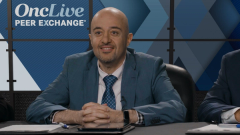
Case 1 Presentation: Lower-Risk MDS with Multiple Chromosomal Abnormalities
Guillermo Garcia-Manero, MD presents a case of lower-risk MDS with chromosome 5q and 20q deletions and a p53 mutation, and discusses first- and second-line treatment selection.
Episodes in this series

Transcript:
Rami Komrokji, MD: Guillermo can tell us a case and then carry out the discussion about the treatment for low-risk MDS [myelodysplastic syndrome].
Guillermo Garcia-Manero, MD: This is the first patient profile. It’s a 55-year-old woman who is postmenopausal and up to date in terms of colonoscopy and other risk screenings. There’s no family history or significant exposures. She comes to our community practice with symptomatic anemia and no other B symptoms. You do laboratory work and find a seed of erythropoietin level of 100 mU/mL. After excluding all other courses that we mentioned earlier for anemia, you perform a bone marrow examination that includes cytogenetics and an MDS assay. You find 3% marrow blast. You start thinking about what to do while you’re waiting for the cytogenetics and MDS results, which can take a few days to a few weeks depending on when you work.
In first-line therapy, the patient receives an ESA [erythropoiesis-stimulating agent]. In the interim, you receive the results of your cytogenetic and MDS analysis, in this case a month later. If you’re working in a community center, you need to send this ESA out. You find that this patient has an alteration of chromosome 5 and a chromosome alteration of 20, in 15 of 20 cells. But you find a mutation also in the TP53 gene, and you’re intrigued by this. You inquire with the lab that sent you the information, and you find that the VIF, or value intermediate frequency, of that mutation is at the threshold of detectability—maybe 2%. It’s a low-level mutation, but it’s there. You continue the ESA—you already were a month into therapy when you got these data—and after 3 months the patient remains transmission dependent and is referred to an academic center.
The bone marrow exam is repeated at that time, showing similar results to the baseline, so there was no evolution that was good for the patient. There’s a team discussion in terms of what the second-line therapy will be for this patient, whether you would go with lenalidomide in the del(5q) alteration, consider a hypomethylating agent, or consider a stem cell transplantation because the patient has a potentially high-risk TP53 mutation. This is discussed with the group, and the patient is started on a standard dosage of lenalidomide, which is 10 mg orally daily. Then you repeat the bone marrow [exam], and you have similar data that you had before, with a low-level TP53 mutation.
You continue the therapy for 3 months. At that point, the patient is having a [INAUDIBLE] response to this drug. She’s transfusion dependent but still anemic, so you didn’t achieve a satisfactory hemoglobin level. You repeat this bone marrow exam. Now the patient is in complete cytogenetic remission. The ... are gone, but maybe the VIF is a little higher. Now the 5% was done in the same lab. The patient is stable 1 year after starting lenalidomide.
The points of discussion for the group are in the TP53 mutation, does the panel think the lenalidomide is safe? Perhaps we can also discuss the issue of this mild increase in VIF from 2% to 5%. Is this something to be worried about? This is a young patient. Should we consider the patient for stem cell transplantation? Would there be a potential role for hypomethylating agent–based therapy?
Transcript edited for clarity.








































